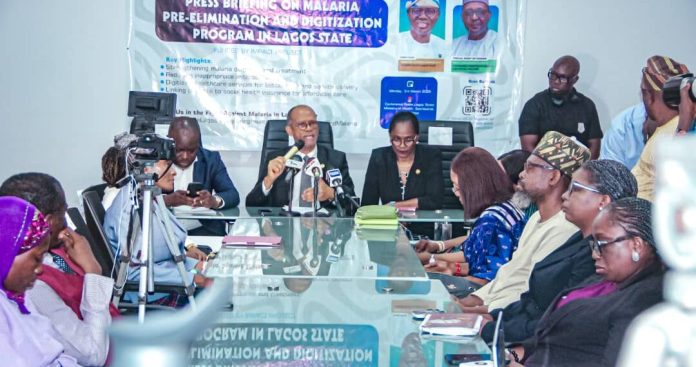The Lagos State Government is launching a new initiative aimed at reducing malaria prevalence to less than 1% through digital health solutions, improved case management, and stronger public-private partnerships.
Announcing the Pathway to Malaria Pre-Elimination & Digitization Program, the Commissioner for Health, Prof. Akin Abayomi, states that the project marks a major step toward eliminating malaria in Lagos.
“Lagos already has a malaria prevalence of less than 3%, which is significantly lower than the national average. With this initiative, we are advancing efforts to completely eliminate malaria while ensuring accurate diagnosis and treatment through a scientific, digitalized approach,” he explains.
Despite having a lower malaria prevalence compared to other states, Lagos still records around 900,000 malaria cases annually, with more than 50% of outpatient visits in public hospitals related to febrile illnesses presumed to be malaria.
Prof. Abayomi highlights the economic burden of malaria, noting that it leads to absenteeism from work and school, reduced productivity, and increased household healthcare costs.
“Malaria is not just a public health concern; it has significant social and economic consequences. The cost of treatment, along with lost productivity, amounts to billions of naira annually. A malaria-free Lagos means a healthier and more prosperous society,” he states.
A key component of the program is the integration of digital health technology to improve malaria surveillance and case management.
Through a partnership with Maisha Meds, Lagos is deploying real-time electronic malaria reporting systems across both public and private healthcare facilities to enhance data accuracy and response times.
The initiative also mandates the use of rapid diagnostic tests (RDTs) before administering any malaria treatment. According to Prof. Abayomi, many patients currently receive anti-malarial medication without proper testing, leading to misdiagnosis and inappropriate treatment.
“With this program, only confirmed malaria cases will receive treatment. This will curb the misuse of antibiotics, which contributes to drug resistance,” he explains.
Given that a large number of malaria cases in Lagos are treated outside government hospitals, the initiative will incorporate private healthcare providers, including community pharmacies and patent medicine vendors, into the state’s malaria control network.
The Lagos State Government is also collaborating with the Pharmacy Council of Nigeria (PCN) and the National Malaria Elimination Program (NMEP) to standardize malaria treatment across all healthcare facilities.
“This means that whether a patient visits a public hospital, private clinic, or neighborhood pharmacy, they will receive the same standardized malaria diagnosis and treatment,” Prof. Abayomi adds.
The Commissioner underscores the need for a behavioral shift in how Lagos residents perceive and treat malaria.
He notes that many people self-diagnose and buy anti-malarial drugs without testing, a practice that the new initiative aims to eliminate.
“Not every fever is malaria. Many are caused by bacterial or viral infections that require different treatments. This program encourages people to get tested before taking any medication,” he stresses.
To ensure affordable and accessible malaria treatment, the Lagos State Government is integrating malaria care into the Ilera Eko health insurance scheme, allowing registered enrollees to receive malaria tests and treatment at minimal or no cost.
The formal launch of the initiative is scheduled for March 4, 2025, at Eko Hotel, Lagos. The event will be attended by Governor Babajide Sanwo-Olu, Health Minister Prof. Muhammad Ali Pate, and representatives from the World Health Organization (WHO), the World Bank, and the National Malaria Elimination Program (NMEP).
The Lagos State Government reaffirms its commitment to leveraging technology, strengthening partnerships, and implementing data-driven policies to eliminate malaria and improve public health outcomes.












